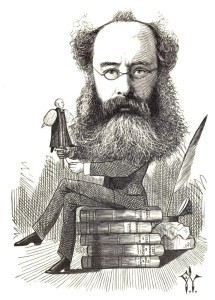The Completists
There are a few writers that, if you read one of their books, you’ve got to read them all. There’s something compulsive about it. Other writers can attract for a book or two, but the completists demand your devotion. John Steinbeck was the first of these for me. I read his Red Pony novella when I was in junior high. In high school some poets, T.S. Eliot, W.S. Merwin, Sylvia Plath. Plus Ursula Le Guin, Robert A. Heinlein and J.R.R. Tolkien. I plowed through all of Dickens and then most of Tolstoy in a rush. Doris Lessing. Later on it was the classic noir writers, like Patricia Highsmith, James M. Cain, Jim Thompson, Hammett and Chandler. Patrick O’Brian’s Aubrey–Maturin series. Then Alan Furst, Philip Roth, others I’m not calling to mind right now. Lately it’s been Anthony Trollope. I hesitate to confess that I never dipped into him before, and am equally hesitant to declare him great, he’s so wrong-headed politically and creakily patrician concerning social relationships. Trollope’s world is all above-stairs Dukes and Duchesses. His causal anti-Semitism is an ugly stain on his escutcheon. He’s a fox-hunting enthusiast, for pity’s sake, a cruel activity that I loathe. Trollope is the direct opposite of all that’s currently hip in literature. But for all that I find him engrossing. There is something sneakily modern about his approach to the world. He’s more hard-headed than Dickens (they were contemporaries). And on money he’s relentless: “Of all novelists in any country, Trollope best understands the role of money. Compared with him even Balzac is a romantic.” — W. H. Auden




